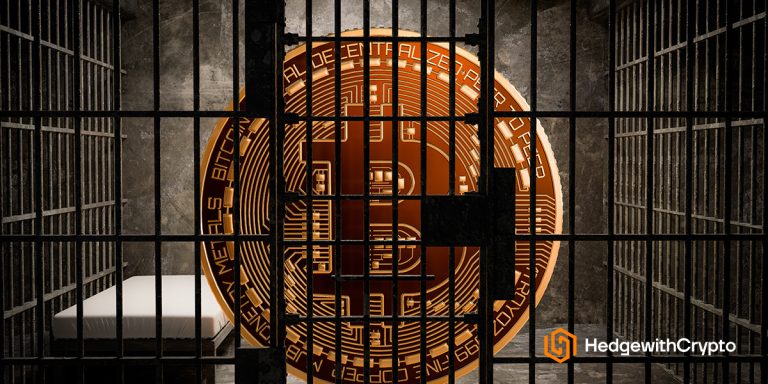Bitcoin Can Run Without The Internet: Here’s How
Key Takeaways:
- Without an active Internet connection, the Bitcoin network would stop working, and transactions would be unable to be processed or transferred.
- Alternative communication methods could potentially be used to process Bitcoin transactions until the Internet is restored, albeit with reduced efficiency.
- If the Internet halted, a record of the Bitcoin blockchain would still remain on associated computers.
TABLE OF CONTENTS
The Internet has become crucial to the operations of the cryptocurrency industry. It has provided the bedrock for nearly all the infrastructure that individuals use to interact with the cryptocurrency ecosystem. However, when storing value within intangible digital assets that can only be seen on an Internet-connected device, it is normal to be a little concerned about the outcome if the Internet goes down.
This Is What Happens to Bitcoin if the Internet is Shutdown
The Bitcoin blockchain is a distributed public ledger that stores a record of all Bitcoin transactions that occur within the network. If the Internet was shut down completely, the Bitcoin network would come down to a grinding halt until it was restored or an alternative communication method was established. However, a record of the Bitcoin blockchain would remain on all of the computers involved in running the network. While a loss of the Internet would not cause Bitcoin to go to zero or disappear, transactions cannot be processed or transferred until the Bitcoin nodes are connected and a consensus is established.
Does That Mean Bitcoin Be Used Without The Internet?
The Internet is one of the main ways Bitcoin transactions are broadcast across the blockchain network and distributed across its public ledger. Without the Internet, thousands of computers globally will not be able to validate transactions (in a process called Bitcoin mining) to update the network. This would dramatically slow down the network; however, a record of the latest Bitcoin transaction would remain on all of the computers involved in the network. Transactions could still be processed via alternative communication methods until the Internet is restored.
It should be considered that a total failure of the Internet is extremely unlikely, and if a blackout did occur, it would likely plunge society into chaos. With no Internet, stock markets would crash due to an incapacity to trade, businesses worldwide would grind to a halt, and debit and credit cards would be rendered useless. With chaos ensuing, could Bitcoin still be accessed? Fortunately, the answer is yes.
Ways to Use Bitcoin Without the Internet
In the event the Internet is shut down, there are alternative ways to send cryptocurrency transactions safely. The most probable ways to use Bitcoin without the Internet are using radio, satellite, and SMS.
- Radio. In 2019, two Bitcoin developers exchanged BTC across a distance of 4000km using radio waves and Bitcoin’s layer 2 Lightning Network. The transaction was sent from Rodolfo Novak, Co-Founder of CoinKite, who was situated in Toronto, to Elaine Ou, a Bloomberg columnist based in San Francisco. Although labor intensive, Bitcoin can be sent and received using a meshed radio network to anyone with an applicable antenna.
- Satellite. Blockstream, a company dedicated to improving Bitcoin functionality, announced in 2017 that it had developed an option to send Bitcoin via satellites. Now termed the Blockstream Satellite, the network distributes the Bitcoin blockchain 24/7 without the need for the Internet. Anyone with a small satellite receiver can then receive the Bitcoin blockchain on the ground. According to Blockstream, in addition to protecting against Internet vulnerabilities, the option can lower costs and increase network stability.
- SMS. SMS messaging could still be operational in a world without the Internet, and it has been proven capable of sending Bitcoin transactions. Certain cryptocurrency wallets, such as Samourai, allow users to execute Bitcoin transactions using SMS without an Internet connection. As each SMS must be less than 160 characters, transactional information is split between multiple messages and then reassembled at the receiver. The SMS service was developed specifically for those struggling with Bitcoin censorship.
As Bitcoin transactions are completely public, there is nothing to hide. This means that transactional data can be sent using a combination of the methods described above. However, due to the efficiency of the Internet, none of the other methods have garnered commercial success, but each method means that Bitcoin can continue if the Internet is ever switched off.
Bitcoin Has Survived in Countries Where the Internet is Restricted
Internet disruption is not new. Even with the advancements in Internet infrastructure, large parts of the world have had to find ways to circumnavigate patchy connectivity. But patchy connectivity has not stopped Bitcoin from thriving in these communities. Several countries around the world suffer from hyperinflation and severe instability within local banks. As a result, Bitcoin is often seen as a stronger alternative to many national currencies worldwide.
Inflation is a common problem across the world. While it does not affect the Internet, it does cause major disruption to banks and can make accessing fiat currency difficult. For example, Venezuela has witnessed some of the highest inflation levels of any country over the last 40 years. Inflation has soared by 130,060%, which has resulted in an extremely unreliable banking system. Even though Internet connectivity is not always reliable, many residents have turned to Bitcoin as a lifeline.
Similarly, in 2020, the citizens of Lebanon were confronted with a liquidity crisis that stemmed from too much government debt. Local banks refused to process withdrawals, which left many families without a means to acquire fiat currency. With ongoing concerns regarding the accessibility of funds, many workers in the country now choose to be paid in Bitcoin.
Across African nations, where the Internet is only accessible to 22% of individuals, Bitcoin also continues to thrive. Many African currencies are weak against the US dollar, which is required for the majority of global trade. Currencies are also not easily transferable across borders. On the other hand, Bitcoin can be traded with suppliers worldwide, which lowers costs and increases profitability. As a result, more and more merchants within the country are favoring Bitcoin as a payment method, and popular mobile payment services, such as M-Pesa, are incorporating cryptocurrency compatibility.
It may be strange to think that an Internet-based digital asset, such as Bitcoin, can provide an answer to those with limited Internet connectivity. However, a digital currency stored on a decentralized blockchain can be more effective in some cases. During an Internet blackout, Bitcoin could become far more dependable than traditional fiat.
This Is How Can The Internet Be Taken Down
Even though the Internet was designed with survivability in mind, the system is far from invincible. In recent years, Ethiopia, India, and Iran have shut down the Internet several times to diffuse protests, and Russia has followed in the footsteps of China by developing a strict firewall to block unwanted content. According to a report published by the Internet movement #KeepItOn, there were 182 shutdowns in 34 countries during 2021, a 14.5% increase from 2020. However, in many of these instances, the whole Internet is never shut down—only parts of it are.
Like Bitcoin, the Internet was designed so that there is not one entity at the center. There is not a single entry point that data flows through. Any computer running Internet protocols can communicate with any other computer using the same protocols. The result is a complex network of government and commercial servers, plus billions of individual users. As a result, it would be extremely unlikely for the entire Internet to shut down. It would require all computers and all servers everywhere to go offline. Even when certain parts of the Internet are shut down, the Internet was designed so that data can flow around the affected areas.
Unfortunately, home computers and laptops that are used every day are still susceptible to Internet blackouts. Home-based Internet devices have a single point of failure due to their reliance on Internet Service Providers (ISPs). ISPs provide the Internet infrastructure to people’s homes and allow access to the servers that host websites. As a centralized entity, ISPs create a single point of failure that can often suffer from infrastructure problems or censorship issues.
- Infrastructure failures. Many individuals experience local Internet outages daily. These usually occur due to a power or technical problem. A local outage can make simple tasks, such as accessing a payment provider or cryptocurrency exchange, extremely difficult. Although frustrating, fortunately, local outages are usually temporary.
- Censorship. On the other hand, censorship of the Internet can last much longer and result in much more severe implications. Rather than disabling the Internet, companies or governments can block certain content from circulation or opt to stop Internet traffic altogether. For example, in 2011, the Egyptian government ordered ISPs to prevent Internet traffic in and out of the country. Worryingly, most countries, including the UK and US, hold the same level of control at times of national crisis.
Frequently Asked Questions
What happens to Bitcoin if there is no Internet?
In the event that the Internet disappears globally, all Bitcoin mining nodes would stop synchronizing and stop recording transactions. The Bitcoin ledger would be frozen in time. When a method to connect Bitcoin nodes is reinstated, Bitcoin nodes would need to re-sync. If consensus was found, Bitcoin transactions could continue.
Can Bitcoin be stored offline without Internet?
Yes. Bitcoin can be stored offline in cold storage wallets without a connection to the Internet. Cold storage wallets are physical devices that can be connected to a laptop or computer via USB. Only when connected, can Bitcoin be transferred or moved. Cold storage wallets remain one of the safest ways to store cryptocurrencies.
Can the Bitcoin network go down?
The Bitcoin blockchain is a decentralized ledger, that is recorded and updated on tens of thousands of computers worldwide. As a result, it is highly unlikely for the Bitcoin network to be shut down. Even during a total collapse of the internet, the Bitcoin ledger, which records all transactions and documents all user’s holdings, would remain frozen in time until Bitcoin nodes are operational once again.




